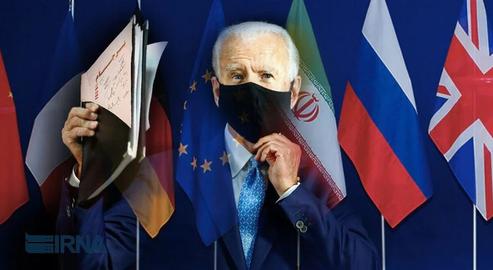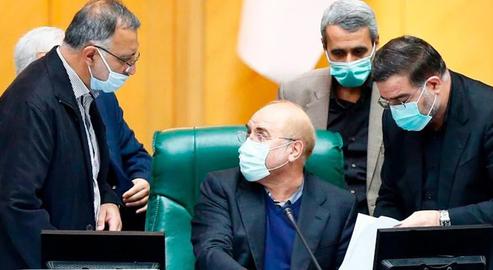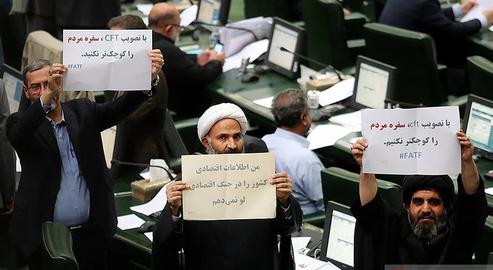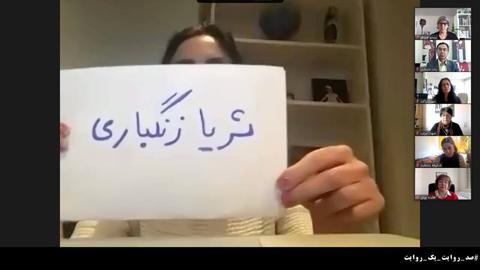In recent days, the Iranian parliament’s Research Center has published two authoritative texts that indicate the government’s pessimism about the possible renegotiation of the JCPOA.
As debate continues to swirl around the JCPOA’s chances of revival, the lifting of international sanctions and the easing of tensions between Tehran and Washington, politicians inside Iran meanwhile remain sharply divided on the subject.
The conservative-dominated Iranian parliament has not yet displayed much support for a return to the JCPOA, and these two papers go some way to reveal the dour mood behind closed doors in the legislature.
Research Center Troubled by Joint Commission’s Optimism
The first expert-driven report, entitled Indirect Negotiations between Iran and the United States Within the Framework of the JCPOA, has cast doubt on a statement issued by the chair of the JCPOA Joint Commission last week.
Following the last virtual meeting of the commission, the chair said: “Participants recognised the prospect of a full return of the US to the JCPOA, and underlined their readiness to positively address this in a joint effort. Participants also emphasised their commitment to preserve the JCPOA and discussed modalities to ensure the return to its full and effective implementation.”
For its part, the Parliamentary Research Center wrote that the statement had been "contrary to the stringent policies of the Islamic Republic of Iran in five respects."
Its first objection was on the grounds that "the measures taken by the United States to lift only part of the sanctions will not serve Iran's economic interests; rather, by maintaining the structure of sanctions, the United States will seek to generate leverage against Iran on missile and regional matter."
The Research Center also considered the meaning of "modalities" in the Joint Commission’s statement. These “modalities”, it asserted, were construed as meaning “step-by-step returns” and so the plan would “in practice turn the process of verifying sanctions on Iran into an essential action".
The Research Center’s third objection was that "Accelerating the other side's efforts to lift sanctions is not in line with Iran's policy of forcing the United States to return to the JCPOA". Furthermore, its authors asserted, "the main goal for reviving the JCPOA should be Iran's long-term interests. Short-term objectives, including elections, should not delay or hasten the process."
The fourth objection to the Joint Commission’s statement was the possibility it implied of resuming direct talks between Iran and the United States, hosted by Europe. On this point, the Center’s report stated: "The gradual process of recognizing the US presence among the member states still in the JCPOA, is against Iran's national interests."
Finally, the Research Center’s writers said, "In none of the submitted proposals is a role considered for the [Iranian] parliament. The government cannot commit to implement any plan or proposal in the JCPOA Joint Commission without coordination and consultation with parliament."
Parliament has Little Faith in Sanctions Being Lifted
This excoriating report came after another that was previously published by the Center. That publication had shown the Iranian parliament on the whole has little hope that the US rejoining the JCPOA will solve Iran’s economic woes.
Entitled Planning the Country's Economy in the Face of Sanctions, that report sought to illustrate in four sections why international sanctions would remain in place even if the JCPOA was revived. Iranian officials, it asserted, must make both their medium- and long-term plans sound and sustainable, and on the basis that most sanctions will remain in place.
The first part of this detailed report described the extent of the legal challenges any lifting of sanctions would face. The authors based their reading on US government documents. The process of "lifting sanctions", they said, might appear simple and straightforward at first glance but in practice, it would be “legally very difficult and frustrating” due to issues such as domestic US law, and the intertwining of nuclear and non-nuclear sanctions.
Furthermore, this paper stressed, "Even if the United States lifts sanctions on paper, it has a number of tools at its disposal that could prevent the Iranian economy from actually benefiting from the lifting of sanctions.”
The second part of the report examined current US economic and security doctrine. It claimed that lifting sanctions was not on the US’s agenda for several reasons: "The US economy will suffer from the lifting of sanctions and the increase in Iran's oil and gas exports. In the political and security spheres, if sanctions are lifted, the possibility of cooperation between Iran and China and Russia will grow, which will increase the scope of collaboration in the region and in Asia, which will cost the United States dear."
The third part of the Parliamentary Research Center’s report stressed that "the release from sanctions should be aimed at reducing vulnerability... If the lifting of sanctions is taken for granted in the minds of the country's officials and policymakers, then the realization or continuation of destructive trends will not be far away.”
For this reason, it stated, "the medium-term and perhaps long-term planning of the country's economy should be done on the assumption that sanctions will last."
In the final section of this pessimistic report, the Parliamentary Research Center discussed the requirements of Iran's domestic political economy. If the issue of “lifting sanctions” remained at the forefront of people’s minds, it said, it could allow for the ongoing poor management of public finance, banking, and macroeconomics.
In the area of public finance, the report asserted, the country's budget reliance on oil should be reduced to zero. Foreign trade and “resilience” should be strengthened and food security should be prioritized so that the country suffers less if sanctions do continue.
These two official texts reflect the thoughts and political position of a conservative strand in the Islamic Republic that did not believe in the JCPOA to start with. Hardline politicians have long claimed the JCPOA meant the destruction of the nuclear program, and indeed have called the sanctions a "blessing" and called on the people to “resist” them.
Opposing this trend are the so-called reformists and outward moderates, who, with the inauguration of US President Joe Biden, hope to find a mechanism to revive the JCPOA before the presidential election so that they can continue to dominate the executive – if not anything else – in future.
Related coverage:
Has America Decided to Rejoin the Nuclear Deal?
Khamenei Sets Impossible Conditions to Improve Relations with US
America’s Return to Nuclear Deal Complicated by Iran’s Ultimatum and Attack in Iraq
Uncertain Future for Nuclear Deal as Rouhani’s Presidency Comes to an End
IranWire Exclusive: Javad Zarif is "Frustrated" With the Guards and the Government
Iranians Enter a New Century Poorer and Less Hopeful for the Future
visit the accountability section
In this section of Iran Wire, you can contact the officials and launch your campaign for various problems



























comments